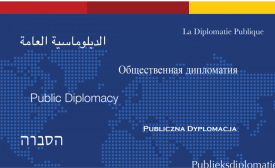public diplomacy

Social media and new technology have spawned a new generation of digital diplomats. Meanwhile, governments try to defend against social media campaigns.
Manifestoes about U.S. “decline,” have become a publishing juggernaut. But this literature is demolished in a beautifully written, persuasive new book from Bruce Jones, the Brookings Institution senior fellow. In Still Ours to Lead: America, Rising Powers, and the Tension between Rivalry and Restraint, Jones explains that the declinists have it all wrong.
The US Department of State is transitioning into a digital context and public diplomacy is evolving in the process. Michael Ardaiolo discusses the U.S. public diplomacy’s shift toward a digital world with Dr. Craig Hayden.
I had to laugh when I heard about the U.S. Agency for International Development’s botched effort to create a Twitter-like platform for Cuba intended to undermine the communist regime. Even the name — ZunZuneo — to the State Department’s credit, sounded like something cooked up in Silicon Valley, not Foggy Bottom.
A generation ago, Canada was perceived to be an exemplary global citizen by the rest of the world: it took the lead on a host of international issues, including the Convention of Child Rights, freedom of information, acid rain, world peacekeeping, sanctions against South Africa's apartheid regime, and humanitarian and development assistance—much of this under conservative leadership.
BBG Watch has learned that a draft bill originating in the House Foreign Affairs Committee, which has U.S. Rep. Ed Royce (R-CA) as Chairman and U.S. Rep. Eliot Engel (D-NY) as Ranking Member, would, if passed by Congress and signed by the President, radically reform the Broadcasting Board of Governors (BBG), an agency currently in charge of U.S. international media outreach.
A powerful pair of lawmakers in the House of Representatives have agreed on major legislation to overhaul Voice of America and other government-funded broadcasting outlets that could have implications for the broadcaster's editorial independence, Foreign Policy has learned.

Read the newest edition of CPD Perspectives on Public Diplomacy, by Dr. Daya Thussu of the University of Westminister.







